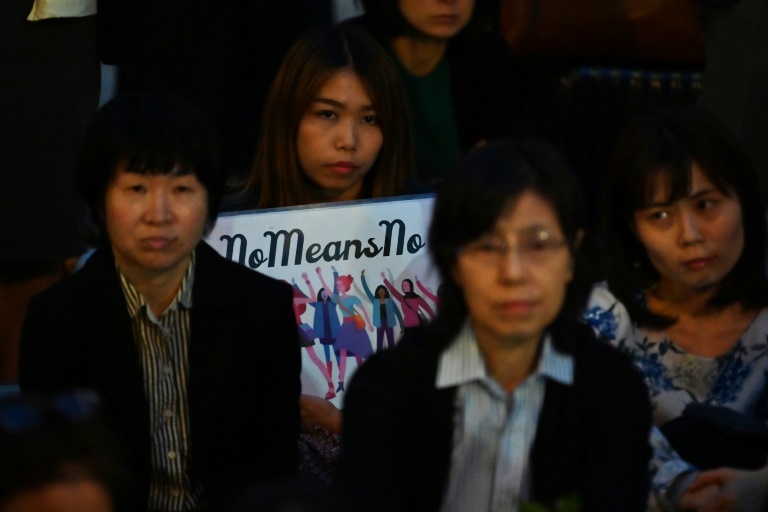TOKYO: Women’s rights protesters are taking to the streets for the sixth time in as many months as anger mounts in Japan over ‘outdated’ rape laws, after a man was allowed to walk free despite sexually assaulting his daughter for years.
A court ruled the father had sexually abused his child from around the age 13 to 19 and even acknowledged he was violent when she resisted, but he was acquitted because the law requires prosecutors to prove there was overwhelming force, a threat, or that the victim was completely incapacitated.
The verdict is being appealed, but it has sparked outrage with hundreds again expected to demonstrate in cities across the nation Wednesday, while an online petition demanding that any sex without consent be defined as rape — signed by more than 47,000 people — has been submitted to the justice ministry.
For Jun Yamamoto, who was abused by her father between the ages of 13 and 20, the story is sickening familiar.
“Again!... That was what I thought,“ the 45-year-old said, adding: “Japanese justice does not recognise sexual offences like this as a crime. I cannot tolerate it anymore.”
The court acknowledged in the latest incest case that the girl had been forced to have intercourse “against her will” and was psychologically subjugated by her father because of the repeated abuse.
But it said it was unclear whether she was “incapable of resisting”, so her father was acquitted of rape.
No protection
Yamamoto, a nurse who also works for the rights of sexual abuse victims, is demanding reforms to the Japanese criminal code.
“When caught off guard or attacked by somebody who should be someone you can trust, you freeze in shock and cannot fight back,“ Yamamoto told AFP.
“Even in a case where a father raped his daughter, the court says she could have resisted and lets him go. This legal situation is really a serious problem.” she said, her voice quivering with barely suppressed anger.
While the global #MeToo movement against sexual abuse has stormed through everything from Hollywood to the Italian opera, it has struggled to take off in Japan.
But calls to protect sex abuse victims seem to be winning support, with hundreds expected to rally holding symbolic flowers in 20 cities nationwide on Wednesday.
In one past “Flower Demo” in Tokyo, advocates held banners reading: “Law MUST protect victims, NOT perpetrators”
“Why do we have to ask for this over and over again?” said a tearful protester on mic. “Are we asking for something so inconceivable?”
Activists and lawyers warn that Japan’s criminal code, which dates back over a century, is incapable of protecting sexual abuse victims.
“When the criminal code was created in 1907, Japan was purely patriarchal,“ lawyer Yukiko Tsunoda explained.
“The purpose of criminalising rape was to assure a wife would bear a child only by her husband and never be accessed by other men... It was a law of chastity which would only benefit a husband or the father of a family,“ she added.
“Who wants to protect a woman who so easily lets a rapist do his thing just after a few punches? That was the thinking.”
Many activists see the law as part of a broader gender problem in Japan, which, despite relatively high rates of female education and workplace participation, remains unequal in many ways.
Tsunoda said that sexist norms remain embedded in the legal system and systematically undermine women’s rights, which according to her explains why Japan is ranked 110th out of 149 countries in the World Economic Forum’s latest gender gap report.
Unsafe for women?
In 2017, Japan revised the criminal code on sexual offences for the first time in 110 years, recognising male victims, and increasing the punishment for rape from a minimum of three years to five.
But the requirement that a victim be able to prove they could not resist assault remained unchanged.
Tsunoda served on a justice ministry panel considering the reforms and urged the requirement be changed, but a majority disagreed, arguing that it could lead to innocent victims being convicted based on the “subjective” views of alleged victims.
A review will happen next year, but it is unclear whether the controversial rule will be up for discussion.
Yamamoto and fellow rights campaigners are hopeful the voices of tens of thousands of citizens who signed the petition will force legislators to reconsider.
“The petition to remove the requirements seems to be the most supported among the opinions we’ve received,“ a justice ministry official told AFP, adding: “We take it very seriously.”
But until changes are made protestors say they will continue to rally across the country on the 11th of each month.
Demonstrator Wakana Goto, 28, told protestors at one rally: “In Japan, with its reputation as one of the world’s safest countries, I have been exposed to sexual harassment since the age of three, forced to get used to it and to learn to deal with it.” — AFP









